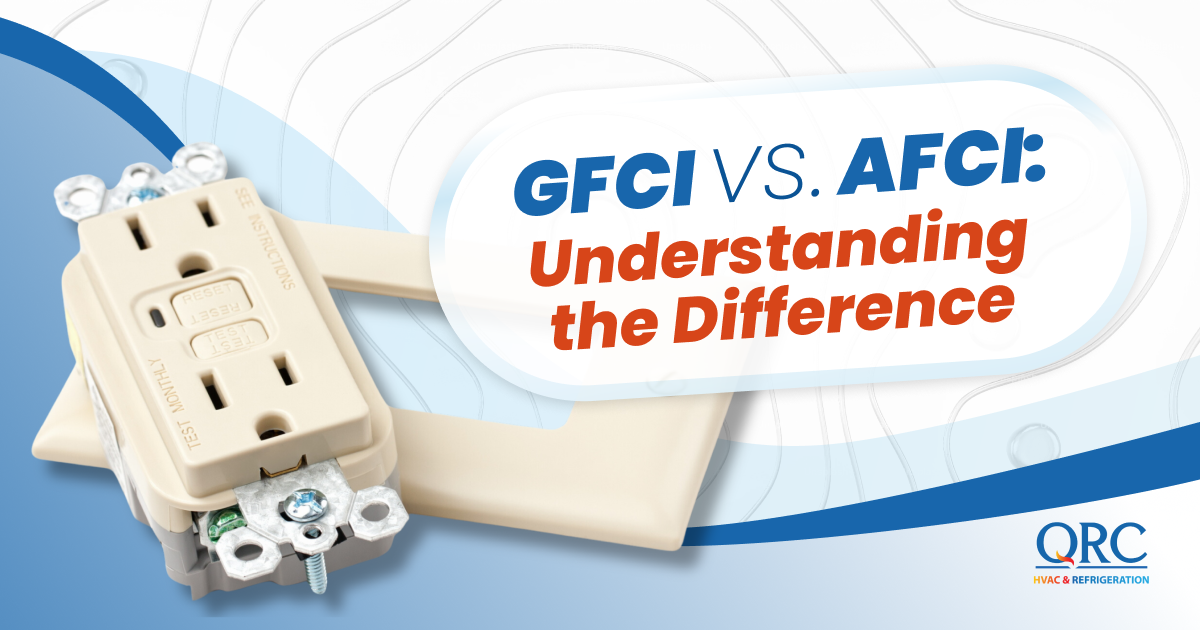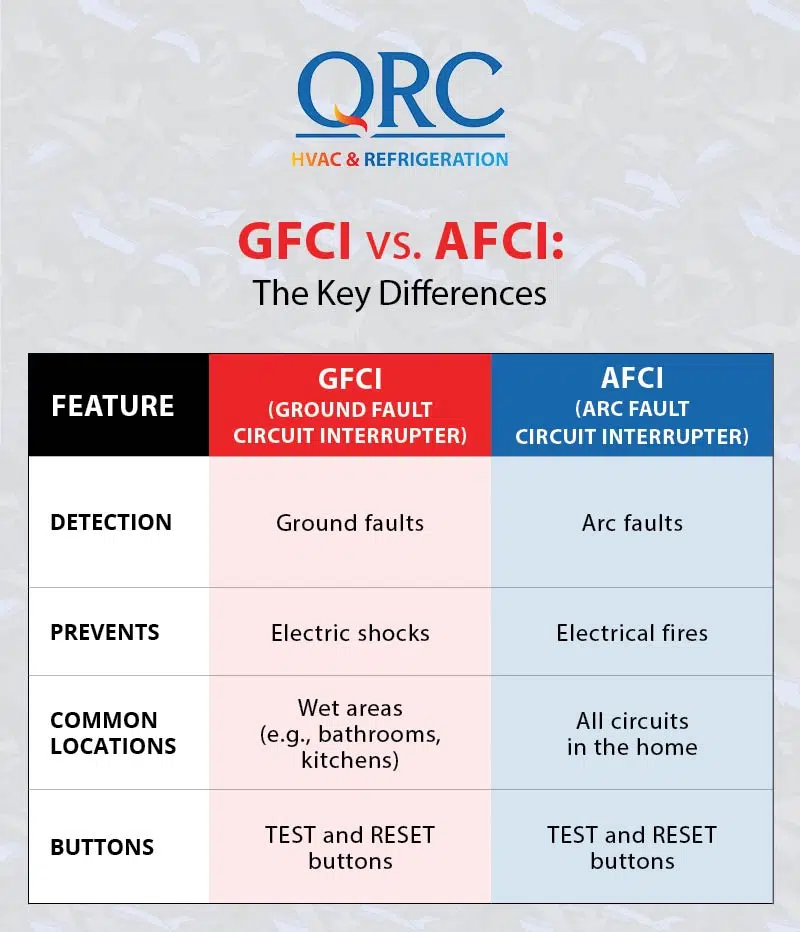
GFCI (ground-fault circuit interrupters) and AFCI (arc-fault circuit interrupters) are two types of outlets you’ll find in every safe, up-to-code house in the US. These important safety devices are installed in electrical outlets. GCFIs prevent electrical shocks due to ground faults, while AFCIs help prevent dangerous electrical fires. 
Read on to explore the difference between GFCI vs. AFCI outlets, where they should be installed, and the electrical services QRC provides to residents in Winston-Salem, Clemmons, Summerfield, Lexington, Kernersville, High Point, and surrounding North and South Carolina areas.
What Is a GFCI Outlet? (Ground Fault Circuit Interrupter)
A ground fault circuit interrupter is a mandatory safety feature in residential buildings per the NFPA 70 National Electrical Code standards. A GFCI outlet has built-in circuit breakers, so if an irregularity in the home’s electrical current is detected, the power disconnects immediately. This stops the risk of accidental electrocution or injury due to ground faults by cutting off the power to the outlet in milliseconds.
GFCIs have TEST and RESET buttons you can check to make sure they’re working correctly. Pushing TEST causes the breaker to trip, instantly cutting the power to the outlet. RESET restores power. Plugging something like a lamp into the outlet makes it easy to tell when the power cuts off and comes back on.
What Is an AFCI Outlet? (Arc Fault Circuit Interrupter)
An AFCI outlet detects potentially hazardous electrical arcs and is designed to shut off power to the electricity flow immediately. Arc faults are usually caused by damaged or deteriorating wiring, poorly installed outlets, or damaged outlets, which allow electricity to “jump” or arc over a gap in the circuit. If the arc isn’t found in time, its high heat could ignite the walls, carpet, or nearby furniture, leading to an electrical fire.
Like GFCIs, AFCI outlets have a TEST button and a RESET, OFF, and/or TRIP position. You can test them in the same way. If the appropriate breaker in your electrical panel trips when you push TEST, it’s working correctly. Make sure to flip the breaker switch all the way off before turning it back on.
GFCI vs. AFCI: The Key Differences
While both outlets have TEST and RESET buttons on the surface and are designed to make your home safer, there are differences between GFCI and AFCI outlets.
GFCIs:
- Detect ground faults
- Prevent shocks
- Usually installed in areas prone to dampness or near water sources
AFCIs:
- Detect arc faults
- Prevent electrical fires
- Usually installed throughout the home, with one on every circuit
Do You Need Both GFCI and AFCI Outlets?
You should have both ground fault circuit interrupters and arc fault circuit interrupters in your home. They’re both important safety features that can prevent serious property damage and injury due to electrical shock and electrical fires.
Where Should You Install GFCI and AFCI Outlets?
According to the National Electrical Code, GFCIs in the US must be installed in:
- Kitchens
- Bathrooms
- Laundry areas
- Crawl spaces
- Unfinished basements
- Wet bar sinks
- Garages
- Utility sinks
- Outdoors
- Underwater lighting
- Damp areas, or areas near water
In both North and South Carolina, AFCI requirements state that arc fault protectors must be installed in:
- Bedrooms
- Family rooms
- Dining rooms
- Living rooms
- Parlors
- Libraries
- Dens
- Sunrooms
- Recreation rooms
- Closets
- Hallways
- Similar rooms and areas in the home
Installing GFCI and AFCI Outlets
We recommend hiring a professional electrician to install your ground and arc fault circuit interrupters. Working with electricity always involves risk, and these outlets need proper installation to ensure your home’s safety.
Contact QRC and schedule a service call with one of our electricians to discuss your outlet issues or where you’d like GFCIs and AFCIs installed. We’ll get the job done the way you want it, keeping safety as a top priority.
Identifying Faulty GFCI and AFCI Outlets
Some signs your GFCI and AFCI outlets may be faulty include:
- Frequent tripping due to damage or wiring problems
- No power to the outlet at all, indicating faulty wiring
- No power after hitting reset during a test
- Sparks
- Scorch marks
- Buzzing sounds
- Visible damage to the casing
Outlets and breakers can wear out with age, making them less effective. If you’ve had the same GFCI or AFCI outlet in your home for longer than a decade, it’s a good idea to have an electrician test the effectiveness.
Additional Electrical Safety Tips
Whenever you’re dealing with electricity, it’s important to keep these safety tips in mind:
- When in doubt, turn the power off and call an electrician.
- A burning smell, sparking, electrical shocks, or frequently tripping breakers are likely electrical emergencies.
- If you notice damaged electrical panels, wiring, or outlets, call an expert for help.
- Avoid overloading your outlets (be mindful of the electrical load).
- Know the difference between GFCI vs AFCI breakers and what to do if they trip.
- Always keep water away from electrical devices and vice versa.
- Use extension cords and plugs safely, checking for damage before use and gripping the plug base when unplugging your devices.
Contact QRC Today
The team at QRC offers AFCI and GFCI breaker installation and repair services to ensure your home is safe and to code. We’ll make sure your electrical system functions safely so you can relax, even while running multiple appliances at once. Our insured electricians are experienced in problem-solving, diagnosing, repairing malfunctioning outlets, customizing outlet placement, and more.
Frequently Asked Questions
Can I install GFCI and AFCI outlets myself, or do I need an electrician?
A professional electrician should install AFCI and GFCI breakers. They’re complex and must be installed correctly. When it comes to electrical safety, even a small error in installation can lead to problems.
How do GFCI outlets protect me from electrical shock?
GFCI outlets can instantly detect irregular electrical currents and shut off the power to the outlet in milliseconds. While you may feel a small shock, it protects you from deadly electrical currents.
How do AFCI outlets protect my home from electrical fires?
AFCI outlets detect electrical arcs, which are caused when electricity “jumps” across a gap. This arc is extremely hot and can ignite a fire in your home. The AFCI outlet turns the power off instantly when an arc is detected, preventing potential fires and alerting you to the issue.

